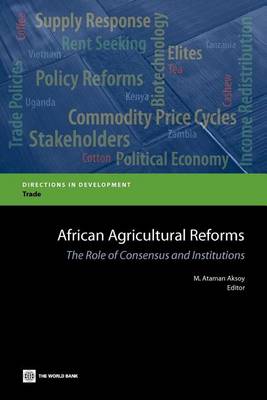Directions in Development. Trade
1 total work
African Agricultural Reforms
Published 30 July 2012
During the 1990s, Sub-Saharan African countries initiated agricultural policy reforms to increase producer incentives and increase growth. Yet, agricultural growth rates after the reforms have been uneven. This has been attributed to lack of supporting infrastructure or the inability to respond to incentives by the smallholders. Based on ten studies, this volume provides a different framework to interpret the outcomes. First, it attributes the success of the reforms to the degree of consensus around the reform programs, which in turn, creates the institutions that can accommodate unexpected shocks. It differentiates between short run growth accelerations and sustained growth episodes. Second, it analyzes the impact of international prices which increased during the early 1990s and collapsed around 2000. Finally, it links the support institutions that evolved after the reforms back to the political economy of the stakeholders and their interests.
